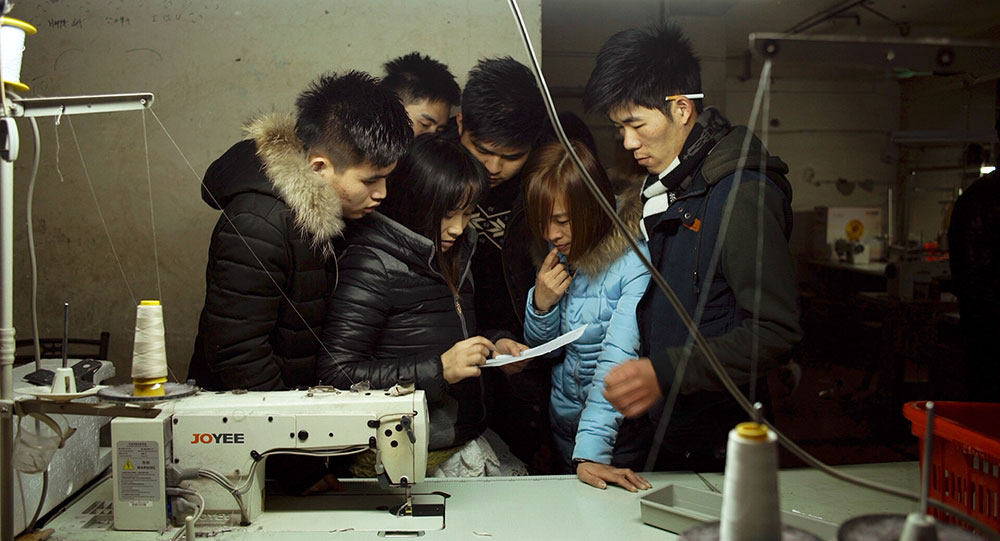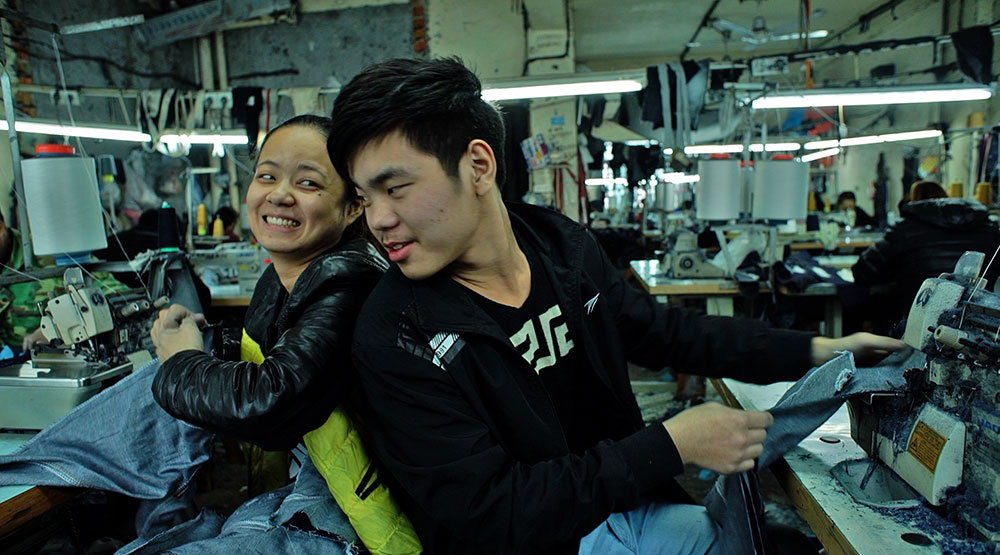How does one gain a sense of history? Sitting through 10 hours of cinematic documentation just to gain a glimpse into a single historical conjuncture through the keyhole of a tightly-framed camera might sound excessive, yet it is shorter than an average shift in the workshops of Zhili and pales in comparison to the 30 years of Chinese economic reform that drowned out the voices of those who operated the mind-numbing whir of machinery inside the “factory of the world.”
Wang Bing’s second and third installments in his Youth trilogy (2023-2024) continue with the textile workers whose bittersweet first experiences of early adulthood filled its first installment, Youth (Spring). Documented over the five years during which Wang lived among the townspeople of Zhili, a textile manufacturing hub in Eastern China, Youth (Hard Times) and Youth (Homecoming) shift their focus from the interpersonal drama of its migrant workers to their struggles interweaving their work life and home life into the fragile whole that holds the weight of their future.
Representing the heaviness of an entire generation’s dead labor through the lightness of symbols—of transient images and sounds—is an insurmountable task. Wang’s attempt to resist commercial cinema’s implicit demand to summarize is a political one. Echoing the psychoanalyst Jacques Lacan’s dictum, “The Real is what resists symbolization absolutely,” Wang’s decision to let the Chinese subaltern speak for themselves in his recent trilogy allows the Real to seep through his camera and leave an imprint on the viewer’s unconscious register in cinematic time. After viewing this trilogy, it becomes impossible to see the same commodities depicted without hearing their voices and feeling the inevitability of events breaking out of the monotony of standardized time—incidents that are not accidents, but allegories of an ongoing struggle and a struggle to come.
Following the U.S. Premiere of Youth (Hard Times) and Youth (Homecoming) at the New York Film Festival, I spoke to Wang Bing about his methods, his idea of temporality, and how he contends with the power of the filmmaker. This interview has been translated into English and edited for clarity.

Y-Z Li: What was your process of filming labor disputes like? When the bosses withheld wages, they seemed quite self-righteous and unbothered about being on camera. I imagine this kind of openness is quite uncommon in China. Did it have anything to do with the particular environment you were filming in?
Wang Bing: In our process of filming, whether with the bosses or the townspeople, we treated everyone the complete same way. We did not have a selective, opinionated view. I considered them all to be people working there—the bosses, the workers.
The bosses had their situations. The workers had their methods. They had a symbiotic relationship and both faced market pressures. The same types of people can be found among workers as well as bosses. They are one group, not two.
In this environment, these bosses are like all Chinese people in real life. The bosses might make money this year and lose money next year. The workers, of course, do not make as much as the bosses, but their risks are smaller. Because of the labor situation in China, this whole industry was privately developed. There was an invisible set of rules between them. Of course, some people would break the rules, like some bosses who fled. These things happen in this industry, I think, hundreds of times a year. But most people follow a certain set of rules: to pay people and maintain mutual trust, or commercial order.
This is kind of like the state of China: it is relatively chaotic. It is only when what you do involves state power that you become aware of the law. The law in China does not protect individual rights, it protects power. When you have interpersonal conflicts, you realize the law is not so effective. When you come into conflict with power, the law is very effective. In the commercial realm, the law is ineffective when it involves rights violations.
YL: After watching the trilogy, you get the sense that shíjiān [time in Mandarin] and shìjiàn [events in Mandarin] have a very intricate relationship. In the films, time felt still, or circular…
WB: When you have to overcompress a film, you lose a naturalness in the story, such that it would feel a lot like a commercial. It would lose a lot of real temporality, the rhythm in which stories take place. It would be less like a documentary and more like a narrative, because only a stronger narrative can condense time. Sometimes in life, stories are not so narrative—so conflictual—but relatively calm. Through the ordinary and the mundane, you can get a sense of their real conditions of existence.
YL: Meanwhile, certain events—because of the stillness of time—felt more special, but also inevitable. After you have observed the workers’ daily lives for so long and sensed a certain thread or logic in them, when an unforeseen event finally happens, it feels very real.
WB: Realness has a process. It needs to be natural, not artificially pushed through editing. I want to seek a sort of naturalness of life. Sometimes, it takes time to compose. Documentaries do not have the perfection of narratives. Those are not the kind of stories documentaries seek, because perfection can only come through design—through thinking and planning. Naturalness is not like that.
YL: Tell me a little about your structure, with 20-minute segments and dozens of characters throughout.
WB: I have experimented with 20-minute segments before, first in Dead Souls [2018]. I discovered that if a segment was shorter than 20 minutes, it would be hard to build a sense of completeness; if it was longer, it would impact the structuring of the whole film. If a segment is only 10 minutes long, you might forget the character. To reach 20 minutes, it demands a lot from the character’s story; it could require 100 or 200 hours of footage.
YL: With 2,600 hours of footage shot, do you have any regrets about anything that you wish you could have captured?
WB: There were a lot of events, conflicts, or stories we could not capture, did not capture well, or could not include. But because we filmed for so long and filmed so many characters, there was not much regret, per se. For shorter documentaries, you might have those regrets.

YL: I was most touched by Homecoming. My family also came from the countryside, so many of its elements feel familiar. Compared to Hard Times, Homecoming seemed to be not only about interpersonal conflicts, but also about contradictions between the landscapes and the characters. Because the landscapes had changed, you got to see the different identities the different landscapes gave rise to.
WB: When they were in Zhili, they were all in a state of work. Their life was just work, or they did not have a life. Every day they were just trying to secure something to eat and somewhere to stay. Their situation was totally temporary. There was no personal life when so many people lived together.
It was different when they returned to their hometowns. They immediately gained a sense of dignity. Although their hometowns were very remote and the living standards there were not superb, they expressed a sense of confidence as free individuals whose humanity was symbolically represented. Additionally, I wanted to clearly explain where they came from—Yunnan, Jiangxi, Anhui, Henan, Hubei, et cetera.
YL: At present—when the media is experienced as a form of power or violence, and therefore feared by many—as a filmmaker who holds some cultural capital, how do you weigh your relation to your subjects and their representation in your films?
WB: I think the way I use films, in reality, dissolves this form of power. Often, power comes from your control over the film’s production. We did not use editing to express the author’s opinion, mentality, or desire for control. The author took a back seat and, in this way, the power of the filmmaker is weakened.
YL: It reminds me of Jacques Rancière’s position in The Ignorant Schoolmaster [1987]: You do not need a teacher to teach people how to read in a new language, they can figure it out on their own if you just give them a bilingual book.
WB: Right. I have also been searching for how to dissolve the power of the filmmaker in the process of composing documentaries, because this kind of film does not have the top-down feeling of narratives. Some other filmmakers’ films are didactic, delivering their own opinions through language. It might feel like the author has a clear attitude when it is really a desire for control.
Youth (Homecoming) screens this evening, November 8, and until next week, at Metrograph.



